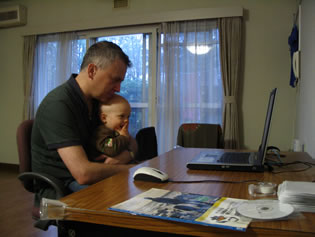| Annual Newsletter of the Slavic Research Center, Hokkaido
University |
Japanese English |
-->List
of All Publications-->Annual
Newsletter-->no.17 |
|
| No.17, January 2010 |
|||
| Our Current Staff |
Ongoing Cooperative Research
Projects |
Visitors from Abroad |
Guest Lectures from Abroad |
Publications (2008-09) |
The Library |
Website Access Statistics |
| Essays by Foreign Fellows |
||
| Andrew Gentes |
Dariusz Kołodziejczyk |
Marina Mongush |
Do We Need a Clark? Transformation of the Polish System of Higher Education after 1989
Dariusz Kołodziejczy k(University of Warsaw and Polish Academy of Sciences/foreign fellow, SRC, 2009)
*Andrew Gentes, Dariusz Kołodziejczyk, and Marina Mongush were Foreign Visiting Fellows at the Slavic Research Center in 2007–2010. The views of the authors show the breadth of the SRC's interests, but are the authors' own.
Having arrived in Sapporo, I was shocked by the omnipresence of monuments dedicated to Dr. William Clark, the co-founder of the Sapporo Agricultural College that was later to become Hokkaido University. The striking number of his monuments, encountered not only on the campus but throughout the city, called to my mind those of Atatürk in the Republic of Turkey and especially its university campuses. Yet, there was one notable difference: Atatürk was not a foreigner.
 |
| The author while writing the essay |
Given my personal aversion towards any cult of leaders, political or otherwise, I became immediately skeptical in regard to the real influence of Clark on the development of the academic curriculum in Japan during his mere few months’ stay in Sapporo. On seeing everywhere his motto “Boys, be ambitious!,” I asked myself: does it mean that the Japanese – including the Meiji-era leaders who actually invited Clark to Sapporo – had not been ambitious before his arrival and had to learn this exotic new notion of “ambition” from an American newcomer? Or is it just a typical colonial belief that the “natives” in Asia and Africa could learn only from enlightened Westerners?
To be sure, I am deeply convinced that any exposure to foreign models and cultures is deeply stimulating. People who do not want to learn from others because they are convinced of their own superiority are simply dull. Yet, there is a great difference between conscious borrowing and uncritical aping of foreign models, without real understanding of their making and potential impact. The question of whether the impressive rise of Japan in the late nineteenth and twentieth centuries was owed to foreign imports or genuine strengths and traditions is already well covered – although by far not solved – in historiography and I am no specialist on this topic.
Yet, in the above context, I want to share a number of thoughts on the recent two decades of transformation as experienced by the Polish academia. In comparison to other communist countries in Eastern Europe, the Polish intelligentsia was relatively more independent, especially after the Stalinist decade of ca. 1947–1956. You could become an engineer, doctor, or even professional army officer without being a party member or even much bothering about Marxist ideology, unless you aspired to a limited number of top career positions. It was worse in human sciences, but unless you wanted to become a political scientist (perhaps it is for that reason that political science is often despised among Polish human scientists even today) or to specialize in the most touchy topics of twentieth-century political history, you could be quite free in your research without the necessity of invoking quotations from Marx in order to explain the result of a medieval battle or viewing an ikebana arrangement as an expression of class struggle in Japan.
After 1956, Poland was perhaps the most liberal country in communist Europe, although this “liberalism” should in no way be idealized. Vicious interfering in people’s careers, beatings by “anonymous individuals,” and even political murders took place, but on a limited scale affecting the relatively limited group of engaged oppositionists. A silent agreement prevailed, according to which the Communist Party ruled while most of the citizens (including numerous party members) attended the Catholic holy mass on Sundays, and knew very well who was responsible for the mass murder of the Polish officers in Katyn, although this was certainly not present in history textbooks. Numerous prominent members of the Polish academia did not hide their WW2-time activity in the Polish Home Army (Armia Krajowa) or their participation in the Warsaw Uprising of 1944, which was militarily directed against the Nazis, but politically against the prospective Soviet control of postwar Poland. I will mention here only three historians: Jerzy Kłoczowski, the rector of the Catholic (private!) University of Lublin, Witold Kula, and Aleksander Gieysztor. The latter two, placed by the Nazis in a POW camp near Lübeck after the fall of the Warsaw Uprising, met there a French officer and fellow historian named Fernand Braudel. The friendship resulted in numerous French fellowships, offered to young Polish human scientists after 1956, when traveling to the West was again made possible.
 |
| On a cruise around Shiretoko |
In 1980, many professors and students participated in the Solidarity movement. Even though communism lasted for another decade as a result of the martial law introduced in 1981, I remember the university, where I studied in the years 1981–1986 and began my work in 1988, as a great place for open discussion. In the mid-1980s, during the written entrance exam, a nineteen-year-old female candidate asked the chair of the examining commission in the presence of about three hundred other candidates whether she was expected to write “the truth” or “what is in the school textbooks.” The audience was amused but certainly not scandalized. In 1983, while attending a study tour to Wrocław (Breslau in German) as undergraduate history students, we heard from our professors that in spite of the present propaganda, most of the city’s development between the fourteenth century and 1945 is related to German culture and German institutions, and it is about them that we should learn in order to understand its history. Finally, participating in entrance exams as a teaching assistant in 1988 (one year before the fall of communism in Poland), I once spitefully commented on the official praise of the local Communist Party committee, enclosed in the folder of one candidate. The older professor, who chaired the commission, immediately put me down for quoting such papers, indicating that we should not bear prejudice but examine the candidate’s knowledge. To everybody present, though apparently not to the candidate who decided to attach the document to his CV, it was obvious that a Party recommendation was not of much help; to the contrary, it could present a candidate in an unfavorable light!
I invoke these anecdotes in order to demonstrate that the universities in communist Poland were never entirely dominated by communist ideology and were never entirely detached from foreign contacts and foreign influences. Even the communist authorities accepted some academic immunities and freedoms. Pride in the fact that the University of Cracow was founded in 1364, and thus belonged to the oldest universities in Central and Eastern Europe, was shared by official propaganda and the members of the Polish academia.
Hence, the great opening of the 1990s finalized by Poland’s entry to the OECD (1996), NATO (1999), and the European Union (2004) was not so very shocking. Many changes were both awaited and welcome. Today, I am happy to see that thanks to the EU’s Erasmus exchange program, my undergraduate students can spend, for free, one or two semesters at the best universities in Germany, France, United Kingdom, and many others, including neighboring countries such as Lithuania, the Czech Republic, Hungary, or Romania, who also joined the EU and can benefit from this program. A number of stages of younger Polish scholars at U.S. universities brought such innovations as student feedback, currently being introduced in all Polish universities but used in my home institute since the 1990s. While a traditional lecture of a European professor was substantial but boring, the American custom of interrupting lectures with outbreaks of laughter was certainly worth imitating and highly welcomed by our students. It is also refreshing to experience my students sometimes announcing that they have just purchased a foreign book that I had praised in my previous lecture, through the Amazon website – an occurrence hardly imaginable twenty years ago when a Western book was equal in value to a monthly salary in Poland. I can assign them a reading in English without expecting much protest, although one must deplore the fact that the admirable progress in English fluency in Poland has resulted in a respective decline in other foreign languages traditionally taught, namely Russian, French, and German.
 |
| The author's one-and-a-half-year-old son exposed to a foreign culture |
Observing the ease with which younger Poles travel today in Europe to study, work, and holiday, one really gets the impression that at least within the EU, borders are disappearing, both in reality and in people’s minds.
Yet, there is another, less optimistic aspect that I want to touch upon. After 1989, the idea that we should adopt “Western standards” became common lip service, heard from the people whom you would never expect to cherish Western democratic ideas. I once heard a minister of education, whose experience of Western life was very limited, announcing that we should transform our system of higher education to fit the American model. Alas, it was not announced whether we should aspire to Ivy League college standard (and whether the ministry was financially prepared to subsidize such colleges) or to the standard of a suburban community college in Alabama, whose students would never attain the level of an average high school student in Poland.
An objective factor that influences the university curriculum in Poland is the tremendous rise in the number of students. In communist Poland, only about 7 percent of each generation graduated from university, and today, this number is approaching 40 percent. Such a shift is certainly beneficial for society as a whole but might badly affect those concerned. A university diploma that once guaranteed employment does not guarantee it any more. A Ph. D. student who successfully defended a thesis could be once certain that sooner or later a university post would be available to him/her. With the rise of undergraduate as well as graduate studies, the alumni will soon be facing unemployment, up to this point virtually unknown in Poland among university graduates. Student riots, motivated by economic and social reasons that have from time to time erupted in Western Europe, might sooner or later come to Poland as well.
The mushrooming of universities – both state and private – in Poland, also has sometimes the reverse effect in regard to the level of teaching. In Turkey, such hastily created new universities have already earned the spiteful label of “slum universities” (Tur. gece kondu, lit. “erected overnight”). Their rectors and faculties, insecure of their academic position, are usually more submissive towards the state authorities than their colleagues from established older institutions, who defend their autonomy against external interference. No wonder that such weak new institutions are often favored by respective ministries, not only in Turkey and Poland, but in Germany and other Western European countries as well. The anti-elitist slogans of 1968, combined with the fact that most Western European countries have long been ruled by social democrats, have created an unfavorable atmosphere towards elitist institutions of learning. In France, such institutions have survived only under the roof of the “grandes écoles,” while ordinary universities, including the once-prestigious Sorbonne, offer mass education of mediocre standard. In Germany, the real research and real scholarship often find refuge in the Max Planck Institutes, while most universities have fallen victim to populist slogans. A few years ago, the University of Warsaw was invited to join a planned Network of Excellence, initiated by École des Hautes Études en Sciences Sociales, Oxford University, and a number of other leading European institutions. Yet, the Selection Committee in Brussels declined the proposal and refused to finance the network, not because it lost to other, better competitors, but because it was deemed “too elitist,” as was confidentially disclosed by one jury member. A refusal to finance a network of excellence under the pretext that it is too elitist then sounded surrealistic to me. Today, I see it as a typical move, entirely in accordance with the predominating educational policy within the EU. No wonder that the best European students and professors still look for more challenges in the United States and thus deprive Europe of its most active innovators and brains.
It is within the latter context that I see the enforced unification of the European higher education system under the label of the so-called Bologna Process. Instead of the five-year curriculum, crowned with an M.A. thesis that resulted from three years of individual research, we will now force a student to write a superficial B.A. after one year of seminar, and an equally superficial M.A. after another two years. Our Ph.D. students, once treated like our younger colleagues and fellow researchers, already deplore the fact that that the Bologna Process has reduced their status to that of ordinary students, subject to yearly examinations and frequent control that have replaced common trust once linking a Ph.D. student with his/her supervisor. The arguments that a common module system (B.A. in three years + M.A. in two years) would make international exchange easier simply does not hold true: the Erasmus exchange program has flourished in the last decade, even before most of the EU countries applied the rules promulgated in Bologna. The argument that such a module system encourages flexibility is equally unrealistic: can we really expect a student holding a B.Sc. in mathematics to join a graduate course in Japan studies and thus join his colleagues who have already studied Japanese for three years while he was studying math? Or vice versa?
In spite of my skepticism, I remember arguing with my colleagues that since we are applying to join the EU, we cannot question the rules that the old members have already agreed upon because we might thus jeopardize our own accession. Today, five years after Poland joined “the club,” I am more certain than before that the Bologna Declaration served the rather populist agenda of EU politicians as opposed to acting in the interests of a decent education. It was simply another urawniłowka (a Russian loanword in Polish meaning “leveling”) that we were familiar with in the communist period. And for leading institutions, which aspire to excellence, leveling is never beneficial.
A fashionable import, today mushrooming in Poland, is gender studies. Some of my Polish female colleagues shared with me their impressions of encounters with German or American “feminist missionary scholars” who treated them like oppressed “natives” who need to be delivered from their “false consciousness.” Any arguments that it was easier to meet a female professor in communist Poland than in many U.S. or Western European faculties were to no avail. Such seemingly amusing misunderstandings become less amusing when one learns that in order to receive Brussels money for a scientific project, one must often meet a required quota of “female participation.” Deeply humiliating for female scholars, who are thus treated as intellectually impaired and in need of an artificial promotion, such politicized numerical criteria again do not serve well the pronounced purpose of attaining excellence. Left and leftist politicians, who usually promote such measures, often forget that a similar philosophy was applied in the 1930s in order to limit the number of Jews at Polish and other European universities. As the Jews were thought to be “overrepresented” in academia in comparison to their percentage in a given society, an “affirmative action” aimed to promote other ethnic groups was in fact directed against Jewish professors, doctors, lawyers, and students, the latter not necessarily originating from rich or educated families. Such knowledge makes one skeptical today in regard to any forms of affirmative action at the university level. They leave scars in the memories of those concerned, who simply feel that they were treated unjustly, and are rarely effective. If such measures are to work, they ought to be applied much earlier, in preschool- and elementary-level education when it is still not too late to make opportunities more equal. Otherwise, they only serve as a face-saving device for politicians, supposed to make up for the failures of the state and society committed at much earlier stages. A good childcare system, maintained by the state, might contribute to a higher participation of women in academia much more effectively than any numerical quotas.
It once occurred to me that perhaps the last two decades were the most “lucky” in the history of the Polish academia. Liberated from bureaucratic constraints imposed by the communist system, we have not yet entered the servile subordination experienced by our German, Danish, or Spanish colleagues towards their respective bureaucratized ministries, and we are even more reluctant to blindly follow the directions of the European Commission in Brussels, the institution that has so far largely escaped any democratic control but has aimed to control the lives of ordinary citizens. Nevertheless, I tend to be optimistic and hope that Europe, including its eastern part, is able to use its tremendous human and economic potential more effectively, also by making its higher education system more competitive on a global scale.